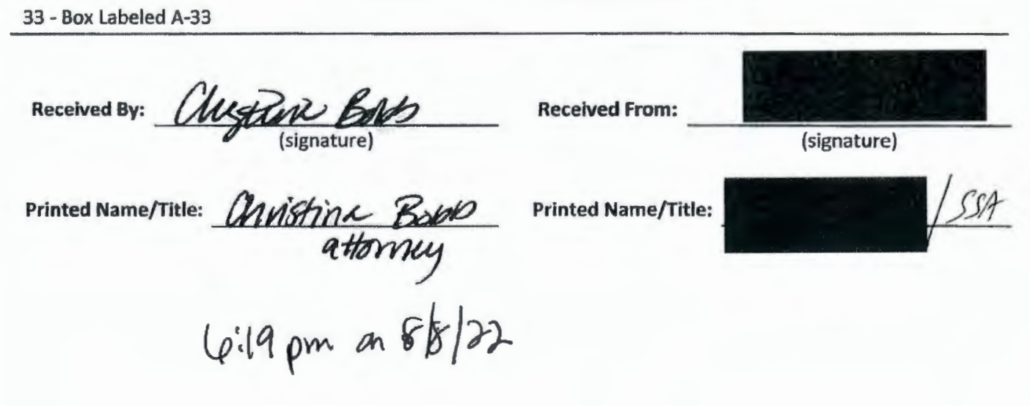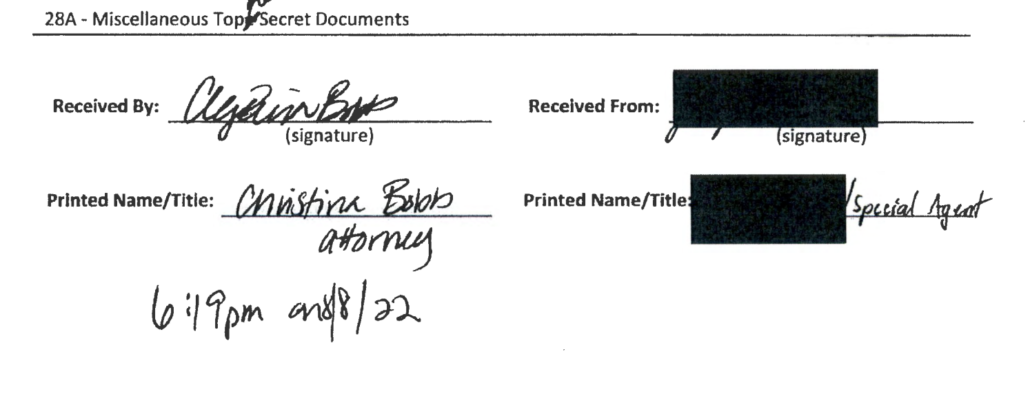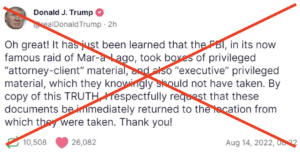Trump’s Timid (Non-Legal) Complaints about Attorney-Client Privilege
Yesterday, I observed that the FBI gave the former President two different receipts for the search on his golf resort.
There’s the one consisting of five boxes and a separate category, “Documents,” not associated with any boxes, signed by the Supervisory Special Agent. There are no classified documents described. I’ll refer to that as the SSA Receipt in this post.
Then there’s the one that consists of 27 items, mostly boxes, many with sub-items, which are often descriptions of the kinds of classified documents contained in the box or the leather case they were seized in. It was signed by a Special Agent. I’ll refer to that as the CLASS Receipt in this post.
I suggested that one explanation for providing Trump two separate receipts might be if the SSA receipt covered evidence showing Trump violated 18 USC 1519, destruction, alteration, or falsification of records in Federal investigations, and the CLASS receipt covered evidence showing Trump violated 18 USC 793, retaining national defense information under the Espionage Act. I argued the two receipts would cover evidence responsive to crimes that might be charged in different venues, DC for the obstruction charge and SDFL for the Espionage charge.
The third statute on Trump’s warrant, 18 USC 2071, removal of official records would cover everything covered by the Presidential Records Act and would generally backstop everything seized under the other two statutes. It covers both. Consider it an umbrella charge.
Today Trump, in the form of a post on Truth Social and related stories shared to Trump-friendly media, has confirmed I’m right that there’s significance to the two separate receipts.
Trump-friendly outlets have explained that “the former president’s team was informed” that the materials seized via what I’ve called the SSA receipt “contain information covered by attorney-client privilege” but that DOJ “opposed Trump lawyers’ request for the appointment of an independent, special master to review the records.”
The FBI seized boxes containing records covered by attorney-client privilege and potentially executive privilege during its raid of former President Trump’s Mar-a-Lago home, sources familiar with the investigation told Fox News, adding that the Justice Department opposed Trump lawyers’ request for the appointment of an independent, special master to review the records.
Sources familiar with the investigation told Fox News Saturday that the former president’s team was informed that boxes labeled A-14, A-26, A-43, A-13, A-33, and a set of documents—all seen on the final page of the FBI’s property receipt —contained information covered by attorney-client privilege.
[snip]
Sources told Fox News that some records could be covered by executive privilege, which gives the president of the United States and other officials within the executive branch the authority to withhold certain sensitive forms of advice and consultation between the president and senior advisers.
I believe there must be some truth to this because if Trump were making completely unsubstantiated claims, he would have made it more generally, claiming that all the boxes must include attorney-client privileged material. Furthermore, Trump’s claims to have watched the search via CCTV notwithstanding, it is highly unlikely Trump has CCTV coverage of his own office, bedroom, and a random storage closet such that he would know what’s in box A-14 (and so on the SSA receipt) versus what’s in box A-15 (which was on the CLASS receipt). Someone who knows the outcome of the search told Trump that one set, but not the other, has materials that are attorney-client privileged. That has to come from the government.
That doesn’t mean my larger hypothesis — that one receipt covered violations of the Espionage Act and the other covered obstruction — has been vindicated. On the contrary, DOJ may simply have chosen to put all records that include an attorney-client claim on a separate receipt so that, if Trump obtains a competent lawyer and demands the Special Master review he’s making a half-hearted request for now, DOJ can move forward with all the other evidence without a 9-month delay like the Special Master review of Rudy Giuliani’s phones necessitated. It would be a clever way of dealing with a very sensitive legal issue.
But I don’t think it’s as simple as that either. Bizarrely, Trump knows something about those boxes such that he’s trying to claim Executive Privilege, in addition to attorney-client privilege.
It’s a nonsense claim, legally. Probably every single box seized last Monday has materials covered by Executive Privilege in them, because every single box would include communications directly with Trump. But there is absolutely no basis for any EP claim for a single thing seized from Mar-a-Lago because the Presidential Records Act underlying the seizure is designed, specifically and especially, to make sure all the EP materials are preserved for history. It’s one of the reasons his refusal to turn over the materials that the Archives were asking for specifically is so insanely stupid, because it gave FBI no choice but to come seize this stuff. Trump’s not making an EP claim to try to delay DOJ’s access to the 27 items, which are mostly boxes, on the CLASS receipt. So he must have learned something about the materials itemized in the SSA receipt to which, in a frantic and transparently silly effort, he’s trying to delay DOJ’s access.
Trump’s announcement that the material on the SSA receipt seems to rule out another possible explanation for the SSA receipt I had been pondering, that it covered the materials that were particularly sensitive from a national security perspective, such as the information on nuclear weapons.
And it doesn’t rule out my hypothesis that that material was seized in the obstruction investigation. Indeed, in two ways, it might corroborate my hypothesis.
There are two theories of the 1519 charge. One, which NYU’s Ryan Goodman is championing, suspects it is about the investigation into Mar-a-Lago, criminalizing the effort in June to withhold materials. If that were the significance of the 1519 charge, separating out the communications between lawyers and NARA and DOJ might make sense, since those would be communications into this investigation. That said, there’d be no basis for an EP claim for any of that, since it all post-dated Trump’s ouster. And as soon as DOJ confirmed that some classified material had been knowingly withheld in June when his lawyers told DOJ that it was all turned over, there’d be a crime-fraud exception for those materials.
My theory of the 1519 charge — that it arose out of NARA’s discovery that Trump had attempted to destroy materials subpoenaed in past and present investigations — would similarly be likely to have attorney-client privileged documents. Take a few examples:
- One thing Trump is likely to have withheld is the Perfect Transcript between him and Volodymyr Zelenskyy, which is something Congress was entitled to get during impeachment. That transcript was hidden from Congress by White House lawyer John Eisenberg, among other lawyers, thereby according the transcript a weak privilege claim, but one easily overcome by the obstructive nature of the choice to withhold it.
- Another set of things we know were withheld from several investigations were documents showing sustained communications with Russia that should have been turned over by the Trump Organization. The most provable of those were the communications between Michael Cohen and Dmitri Peskov’s office in January 2016 (Mueller got his own copy via Microsoft). There’s probably correspondence regarding an invite Russian Deputy Prime Minister Sergei Prikhodko extended to Trump to attend Putin’s St. Petersburg Economic Forum in June 2016. The Trump Organization did not produce to SSCI the copy of Paul Manafort’s Securing the Victory email he sent to Rhona Graff. The subpoena response on all these issues was handled by Trump’s corporate lawyers, Alan Futerfas and Alan Garten, and so would be privileged — but also crime-fraud excepted — evidence that Trump obstructed various Russian investigations.
- While one draft of Trump’s termination letter to Jim Comey was ultimately turned over to Mueller (after reports that the only extant copy was one preserved by DOJ lawyers), the Mueller Report narrative surrounding it makes it clear that Trump and Stephen Miller worked over several drafts before the one shared with others. Those earlier drafts were likely not turned over, in part because White House Counsel lawyers advised Trump that these drafts should “[n]ot [see the] light of day.” Again, that’s legal advice, but also proof of documents that were illegally withheld from the Mueller investigation.
- I don’t want to even imagine what advice from Rudy Giuliani that Trump has withheld from various investigations, particularly pertaining to January 6. Most of that would be (shitty) legal advice. If it was also withheld from proper investigations, though, it’d also be proof of obstruction under 18 USC 1519.
In other words, aside from the documents Trump tried to rip up or eat or flush, many of Trump’s known violations of 18 USC 1519 would involve lawyers directly. Virtually every investigation into Trump was stymied by improper decisions by lawyers. And those withheld documents would once have been privileged, but they’d also be solid proof of obstruction.
And if Trump had reason to believe that DOJ, after predicating an investigation on all the evidence Trump had tried to rip up or eat or flush evidence, had sought and seized all the attorney-client protected materials that had insulated Trump from consequences for his past actions, it might explain one of the biggest puzzles from the last week. For some reason, Trump has worked far harder to obscure that this obstruction investigation exists than that he’s under investigation for a crime with the word “Espionage” in the title. For some reason, Trump is more afraid of the obstruction investigation than the Espionage Act investigation.
One possible explanation for that is that he fears the other secrets he’s been keeping more than proof that he stole a bunch of otherwise innocuous Top Secret documents.
Perhaps the most interesting thing about this latest complaint — first voiced on the 7th day after the search — is it shows that DOJ is in contact with someone presenting themself as Trump’s lawyer.
That’s not surprising. DOJ informed Trump of the search. Even for a simple criminal case into attempting to steal the election (assuming Trump could find someone who would confess to be his lawyer), DOJ would want to have discussions about how to proceed.
In this case, however, the crimes under investigation include, at a minimum, violations of the Espionage Act. DOJ always tries to find a way to resolve those from the get-go, because prosecutions about stolen classified information are always damaging to the equities you’re trying to protect. That’s all the more true in the unprecedented case where the suspect is the former President. At a minimum, DOJ likely has or will float Trump the offer of an offramp like an 18 USC 2701 guilty plea if he cooperates to tell the government about the whereabouts of all the classified documents he stole.
And if what Trump is trying to hide in the obstruction investigation is even more damning, as his behavior suggests it might be, DOJ might actually have enough leverage to make Donny to consider such an offer.
Still, the legal quiet has been making me nervous. I have been waiting all week for a docket to spring up with a Trump motion for a Temporary Restraining Order stalling any access to these files.
For comparison, the docket on a similar challenge from Michael Cohen in 2018 was created just 4 days after the search of his residences, and the discussions about the search began that same day.
On the same day as the seizures (April 9, 2018), the undersigned counsel requested in writing that the U.S. Attorney’s Office for the SDNY return all of the seized property and allow Mr. Cohen and his attorneys the opportunity to screen the materials for privilege, produce any relevant, non-privileged documents to the government, and provide a log of any documents withheld on privilege grounds. Id., ¶ 32, Ex. A. On Wednesday, April 11, 2018, the government responded by letter, rejecting defense counsel’s proposal and informing defense counsel that the government would begin to review the materials at noon on Friday, April 13, 2018. Id. ¶ 33, Ex. B. Accordingly, Mr. Cohen hereby moves for immediate injunctive and equitable relief seeking the opportunity to have his counsel review the seized documents in the first instance, before any review by any law enforcement personnel, for privilege and responsiveness, and, if the Court believes it necessary, for the appointment of a Special Master to supervise that review process.
Trump moved to intervene that same day, April 13, just four days after the seizures.
In the case of the search on Rudy’s phones, SDNY itself asked for a Special Master the next day (though Trump never intervened).
There have to be similar discussions going on now. There just have to be. Trump’s paucity of lawyers — and the conflict posed by the possibility that Evan Corcoran, his most competent current defense attorney, may be conflicted out by dint of having signed an affirmation that Trump turned over all his classified documents in June — cannot explain a full week delay.
But thus far, in spite of every media outlet and their mother filing motions to unseal the search affidavit itself, no one has started pushing to unseal an inevitable fight over access to the seized material. (Again, by comparison, the NYT filed to intervene the day the Cohen warrant docket was made public.)
So for whatever reasons, a full week has elapsed since a lawful search executed on the golf resort of the former President and the first we’re learning about legal discussions — aside from NYT’s revelation that Trump made a veiled threat against Merrick Garland on Thursday — is Trump’s complaint covering just the documents that don’t seem to implicate the Espionage Act.
Something has caused that discussion to remain sealed. And that, by itself, is remarkable.
Update: As klynn reminds in comments, another document that the Trump White House altered was the MemCon of the meeting between Trump and Sergey Lavrov in which he gave the Russians highly sensitive intelligence. I laid out what we know of that alteration, the fall-out, and Mueller’s investigation into it here. If my theory about the SSA receipt is right, that any remaining unaltered record of the meeting found at MAL would be on the SSA receipt. Except the alterations, in this case, are not yet known to involve an attorney, so would not be attorney-client privileged.
emptywheel Trump Espionage coverage
Trump’s Timid (Non-Legal) Complaints about Attorney-Client Privilege
18 USC 793e in the Time of Shadow Brokers and Donald Trump
[from Rayne] Other Possible Classified Materials in Trump’s Safe
John Solomon and Kash Patel May Be Implicated in the FBI’s Trump-Related Espionage Act Investigation
[from Peterr] Merrick Garland Preaches to an Overseas Audience
Three Ways Merrick Garland and DOJ Spoke of Trump as if He Might Be Indicted
The Legal and Political Significance of Nuclear Document[s] Trump Is Suspected to Have Stolen
Merrick Garland Calls Trump’s Bluff
[from Rayne] Expected Response is Expected: Trump and Right-Wing DARVO
DOJ’s June Mar-a-Lago Trip Helps Prove 18 USC 793e
The Likely Content of a Trump Search Affidavit
Some Likely Exacerbating Factors that Would Contribute to a Trump Search
FBI Executes a Search Warrant at 1100 S Ocean Blvd, Palm Beach, FL 33480


